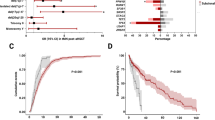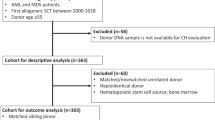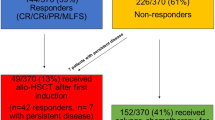Abstract
Somatic mutations in patients with myelodysplastic syndromes (MDS) undergoing allogeneic hematopoietic stem cell transplantation (HSTC) are associated with adverse outcome, but the role of chronic graft-versus-host disease (cGVHD) in this subset of patients remains unknown. We analyzed bone marrow samples from 115 patients with MDS collected prior to HSCT using next-generation sequencing. Seventy-one patients (61%) had at least one mutated gene. We found that patients with a higher number of mutated genes (more than 2) had a worse outcome (2 years overall survival [OS] 54.8% vs. 31.1%, p = 0.035). The only two significant variables in the multivariate analysis for OS were TET2 mutations (p = 0.046) and the development of cGVHD, considered as a time-dependent variable (p < 0.001), correlated with a worse and a better outcome, respectively. TP53 mutations also demonstrated impact on the cumulative incidence of relapse (CIR) (1 year CIR 47.1% vs. 9.8%, p = 0.006) and were related with complex karyotype (p = 0.003). cGVHD improved the outcome even among patients with more than 2 mutated genes (1-year OS 88.9% at 1 year vs. 31.3%, p = 0.02) and patients with TP53 mutations (1-year CIR 20% vs. 42.9%, p = 0.553). These results confirm that cGVHD could ameliorate the adverse impact of somatic mutations in patients with MDS with HSCT.




Similar content being viewed by others
References
Sole F, Luno E, Sanzo C, Espinet B, Sanz GF, Cervera J et al (2005) Identification of novel cytogenetic markers with prognostic significance in a series of 968 patients with primary myelodysplastic syndromes. Haematologica 90(9):1168–1178
Haase D, Germing U, Schanz J, Pfeilstocker M, Nosslinger T, Hildebrandt B et al (2007) New insights into the prognostic impact of the karyotype in MDS and correlation with subtypes: evidence from a core dataset of 2124 patients. Blood 110(13):4385–4395
Walter MJ, Shen D, Shao J, Ding L, White BS, Kandoth C et al (2013) Clonal diversity of recurrently mutated genes in myelodysplastic syndromes. Leukemia 27(6):1275–1282
Papaemmanuil E, Gerstung M, Malcovati L, Tauro S, Gundem G, Van Loo P et al (2013) Clinical and biological implications of driver mutations in myelodysplastic syndromes. Blood 122(22):3616–3627 quiz 99
Haferlach T, Nagata Y, Grossmann V, Okuno Y, Bacher U, Nagae G et al (2014) Landscape of genetic lesions in 944 patients with myelodysplastic syndromes. Leukemia 28(2):241–247
Bejar R, Stevenson K, Abdel-Wahab O, Galili N, Nilsson B, Garcia-Manero G et al (2011) Clinical effect of point mutations in myelodysplastic syndromes. N Engl J Med 364(26):2496–2506
Bejar R, Lord A, Stevenson K, Bar-Natan M, Perez-Ladaga A, Zaneveld J et al (2014) TET2 mutations predict response to hypomethylating agents in myelodysplastic syndrome patients. Blood 124(17):2705–2712
Bejar R, Stevenson KE, Caughey BA, Abdel-Wahab O, Steensma DP, Galili N et al (2012) Validation of a prognostic model and the impact of mutations in patients with lower-risk myelodysplastic syndromes. J Clin Oncol 30(27):3376–3382
Jadersten M, Saft L, Smith A, Kulasekararaj A, Pomplun S, Gohring G et al (2011) TP53 mutations in low-risk myelodysplastic syndromes with del(5q) predict disease progression. J Clin Oncol 29(15):1971–1979
Kaneko H, Misawa S, Horiike S, Nakai H, Kashima K (1995) TP53 mutations emerge at early phase of myelodysplastic syndrome and are associated with complex chromosomal abnormalities. Blood 85(8):2189–2193
Kosmider O, Gelsi-Boyer V, Cheok M, Grabar S, Della-Valle V, Picard F et al (2009) TET2 mutation is an independent favorable prognostic factor in myelodysplastic syndromes (MDSs). Blood 114(15):3285–3291
Takahashi K, Patel K, Bueso-Ramos C, Zhang J, Gumbs C, Jabbour E et al (2016) Clinical implications of TP53 mutations in myelodysplastic syndromes treated with hypomethylating agents. Oncotarget 7(12):14172–14187
Thol F, Kade S, Schlarmann C, Loffeld P, Morgan M, Krauter J et al (2012) Frequency and prognostic impact of mutations in SRSF2, U2AF1, and ZRSR2 in patients with myelodysplastic syndromes. Blood 119(15):3578–3584
Traina F, Visconte V, Elson P, Tabarroki A, Jankowska AM, Hasrouni E et al (2014) Impact of molecular mutations on treatment response to DNMT inhibitors in myelodysplasia and related neoplasms. Leukemia 28(1):78–87
Mallo M, Del Rey M, Ibanez M, Calasanz MJ, Arenillas L, Larrayoz MJ et al (2013) Response to lenalidomide in myelodysplastic syndromes with del(5q): influence of cytogenetics and mutations. Br J Haematol 162(1):74–86
Deeg HJ, Shulman HM, Anderson JE, Bryant EM, Gooley TA, Slattery JT et al (2000) Allogeneic and syngeneic marrow transplantation for myelodysplastic syndrome in patients 55 to 66 years of age. Blood 95(4):1188–1194
Sierra J, Perez WS, Rozman C, Carreras E, Klein JP, Rizzo JD et al (2002) Bone marrow transplantation from HLA-identical siblings as treatment for myelodysplasia. Blood 100(6):1997–2004
Lim Z, Brand R, Martino R, van Biezen A, Finke J, Bacigalupo A et al (2010) Allogeneic hematopoietic stem-cell transplantation for patients 50 years or older with myelodysplastic syndromes or secondary acute myeloid leukemia. J Clin Oncol 28(3):405–411
Koreth J, Pidala J, Perez WS, Deeg HJ, Garcia-Manero G, Malcovati L et al (2013) Role of reduced-intensity conditioning allogeneic hematopoietic stem-cell transplantation in older patients with de novo myelodysplastic syndromes: an international collaborative decision analysis. J Clin Oncol 31(21):2662–2670
Cho BS, Kim YJ, Cho SG, Kim SY, Eom KS, Kim HJ et al (2007) The beneficial effect of chronic graft-versus-host disease on the clinical outcome of transplantation with fludarabine/busulfan-based reduced-intensity conditioning for patients with de novo myelodysplastic syndrome. Int J Hematol 85(5):446–455
Martino R, Caballero MD, Perez-Simon JA, Canals C, Solano C, Urbano-Ispizua A et al (2002) Evidence for a graft-versus-leukemia effect after allogeneic peripheral blood stem cell transplantation with reduced-intensity conditioning in acute myelogenous leukemia and myelodysplastic syndromes. Blood 100(6):2243–2245
Valcarcel D, Martino R, Caballero D, Martin J, Ferra C, Nieto JB et al (2008) Sustained remissions of high-risk acute myeloid leukemia and myelodysplastic syndrome after reduced-intensity conditioning allogeneic hematopoietic transplantation: chronic graft-versus-host disease is the strongest factor improving survival. J Clin Oncol 26(4):577–584
Weisdorf D, Zhang MJ, Arora M, Horowitz MM, Rizzo JD, Eapen M (2012) Graft-versus-host disease induced graft-versus-leukemia effect: greater impact on relapse and disease-free survival after reduced intensity conditioning. Biol Blood Marrow Transplant 18(11):1727–1733
Bejar R, Stevenson KE, Caughey B, Lindsley RC, Mar BG, Stojanov P et al (2014) Somatic mutations predict poor outcome in patients with myelodysplastic syndrome after hematopoietic stem-cell transplantation. J Clin Oncol 32(25):2691–2698
Kim M, Yahng SA, Kwon A, Park J, Jeon YW, Yoon JH et al (2015) Mutation in TET2 or TP53 predicts poor survival in patients with myelodysplastic syndrome receiving hypomethylating treatment or stem cell transplantation. Bone Marrow Transplant 50(8):1132–1134
Della Porta MG, Galli A, Bacigalupo A, Zibellini S, Bernardi M, Rizzo E et al (2016) Clinical effects of driver somatic mutations on the outcomes of patients with myelodysplastic syndromes treated with allogeneic hematopoietic stem-cell transplantation. J Clin Oncol
Kharfan-Dabaja MA, Komrokji RS, Zhang Q, Kumar A, Tsalatsanis A, Perkins J et al (2017) TP53 and IDH2 somatic mutations are associated with inferior overall survival after allogeneic hematopoietic cell transplantation for myelodysplastic syndrome. Clin Lymphoma Myeloma Leuk 17(11):753–758
Lindsley RC, Saber W, Mar BG, Redd R, Wang T, Haagenson MD et al (2017) Prognostic mutations in myelodysplastic syndrome after stem-cell transplantation. N Engl J Med 376(6):536–547
Yoshizato T, Nannya Y, Atsuta Y, Shiozawa Y, Iijima-Yamashita Y, Yoshida K et al (2017) Genetic abnormalities in myelodysplasia and secondary acute myeloid leukemia: impact on outcome of stem cell transplantation. Blood 129(17):2347–2358
Goel S, Hall J, Pradhan K, Hirsch C, Przychodzen B, Shastri A et al (2016) High prevalence and allele burden-independent prognostic importance of p53 mutations in an inner-city MDS/AML cohort. Leukemia 30(8):1793–1795
Sallman DA, Komrokji R, Vaupel C, Cluzeau T, Geyer SM, McGraw KL et al (2016) Impact of TP53 mutation variant allele frequency on phenotype and outcomes in myelodysplastic syndromes. Leukemia 30(3):666–673
Belickova M, Vesela J, Jonasova A, Pejsova B, Votavova H, Merkerova MD et al (2016) TP53 mutation variant allele frequency is a potential predictor for clinical outcome of patients with lower-risk myelodysplastic syndromes. Oncotarget 7(24):36266–36279
Blum W, Bolwell BJ, Pillips G, Farag SS, Lin TS, Avalos BR et al (2006) High disease burden is associated with poor outcomes for patients with acute myeloid leukemia not in remission who undergo unrelated donor cell transplantation. Biol Blood Marrow Transplant 12(1):61.7
Buckley SA, Wood BL, Othus M, Hourigan CS, Ustun C, Inden MA et al (2017) Minimal residual disease prior to allogeneic hematopoietic cell transplantation in acute myeloid leukemia: a meta-analysis. Haematologica 102(5):865–873
Balsat M, Renneville A, Thomas X, de Botton S, Caillot D, Marceau A et al (2017) Postinduction minimal residual disease predicts outcome and benefit from allogeneic stem cell transplantation in acute myeloid leukemia with NPM1 mutation: a study by the Acute Leukemia French Association Group. J Clin Oncol 35(2):185–193
Zhao X, Wang Z, Ruan G, Liu Y, Wang Y, Zhang X et al (2018) Impact of pre-transplantation minimal residual disease determined by multiparameter flow cytometry on the outcome of AML patients with FLT3-ITD after allogeneic stem cell transplantation. Ann Hematol 97(6):967–975
Thol F, Gabdoulline R, Liebich A, Klement P, Schiller J, Kandzjora C et al (2018) Measurable residual disease monitoring by NGS before allogeneic hematopoietic cell transplantation in AML. Blood 132(16):1703–1713
Acknowledgments
Spanish Group of Myelodysplastic Syndromes (GESMD)
Availability of data and materials
The datasets used and/or analyzed during the current study are available from the corresponding author on reasonable request.
Funding
This work has been supported by Gerencia Regional de Salud de Castilla y León (GRS 1033/A/14), Instituto de Salud Carlos III - Fondo de investigación sanitaria (FIS PI17/01741), Instituto de Salud Carlos III - Contratos Río Hortega (CM17/0017), Instituto de Salud Carlos III & FEDER funds (PI16/01302), and CIBERONC Centro de Investigación Biomédica en Red Cáncer (CB16/12/00284).
Author information
Authors and Affiliations
Corresponding author
Ethics declarations
Ethical approval
This research has been performed in accordance with the Declaration of Helsinki and has been approved by the ethics committee of the University Hospital of Salamanca, which has assigned the reference number 2014/07/110.
Conflict of interest
The authors declare that they have no conflicts of interest.
Additional information
Publisher’s note
Springer Nature remains neutral with regard to jurisdictional claims in published maps and institutional affiliations.
Electronic supplementary material
ESM 1
(PDF 230 kb)
Rights and permissions
About this article
Cite this article
Caballero, J.C., Sánchez Barba, M., Hernández Sánchez, J.M. et al. Chronic graft-versus-host disease could ameliorate the impact of adverse somatic mutations in patients with myelodysplastic syndromes and hematopoietic stem cell transplantation. Ann Hematol 98, 2151–2162 (2019). https://doi.org/10.1007/s00277-019-03751-6
Received:
Accepted:
Published:
Issue Date:
DOI: https://doi.org/10.1007/s00277-019-03751-6




